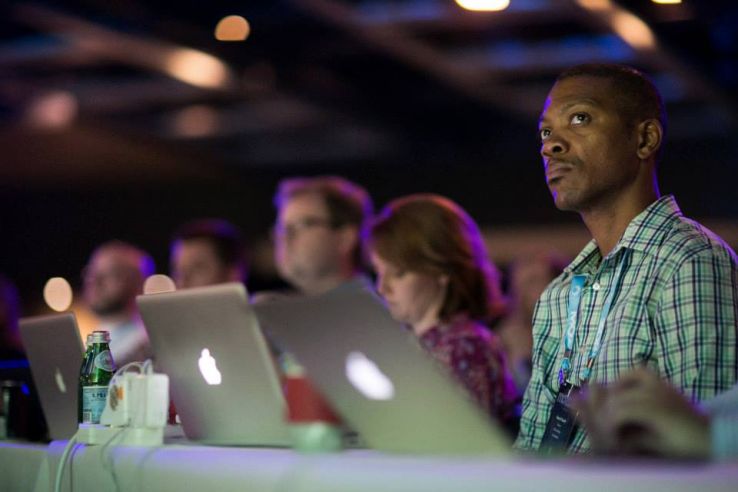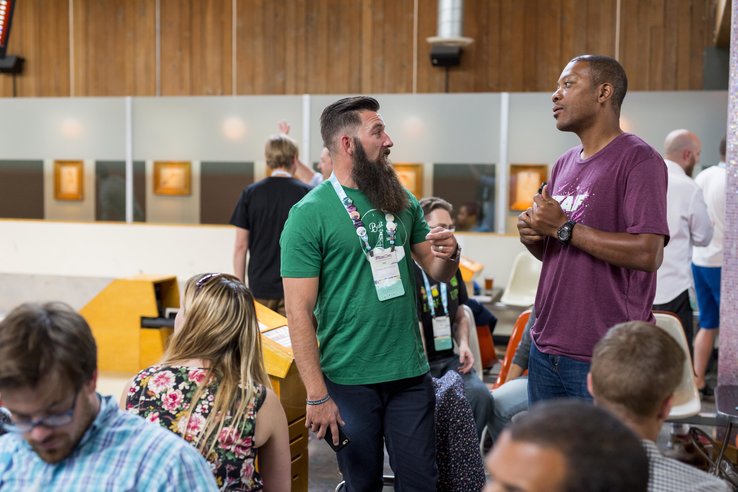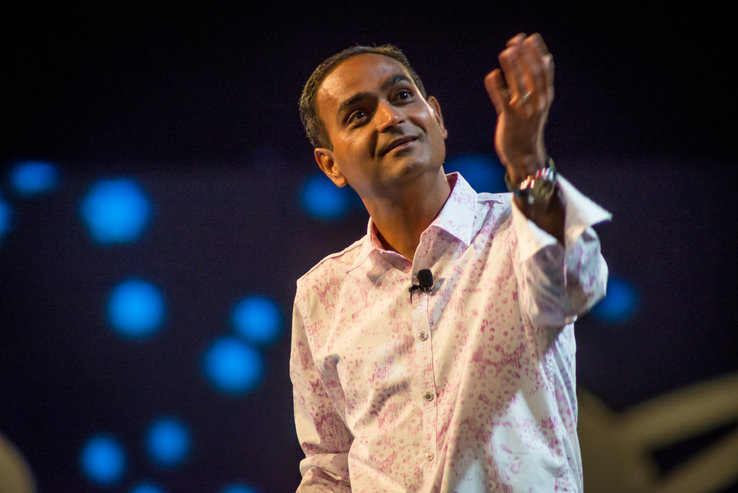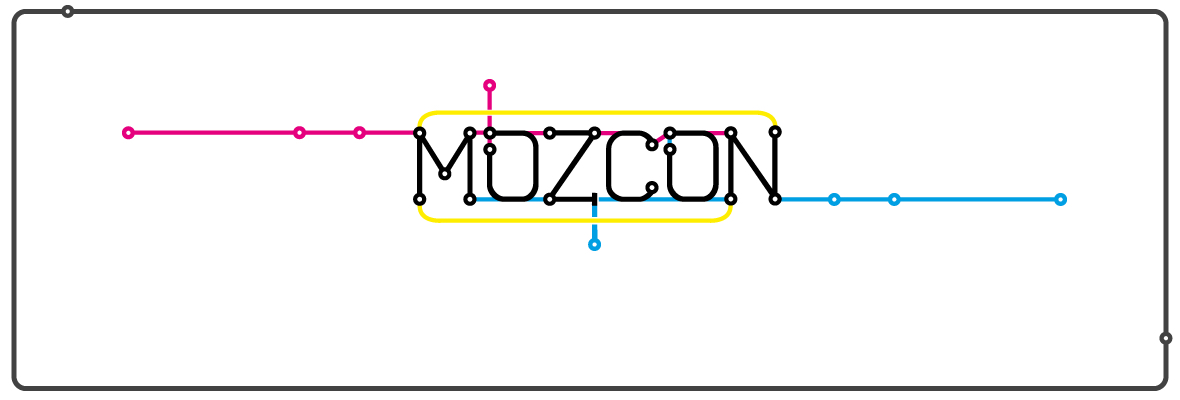
MozCon 2013 (left to right): Greg Gifford, Nathan Bylof, Steve Hammer, Susan Wenograd, and myself
I remember my first MozCon like it was yesterday.
It’s the place where I would hear the quote that would forever change the arc of my career.
“The world is freaking complicated, so let me start with everything I don’t know,” said Google’s Avinash Kaushik, during the Q&A, after speaking at MozCon 2013. “Nine hundred years from now, I will fix what’s broken today. …Get good at what you do.”
Though I didn’t know it at the the time, those were words I needed to hear, and that would lead me to make some career decisions I desperately needed to make. Decisions I never would have made if I hadn’t chosen to attend MozCon, the Super Bowl of marketing events (in my opinion).
Walking into the large (gigantic) room for the first time felt like being on the Space Mountain ride at Disneyland. I hurriedly raced to the front to find a seat so I could take in all of the action.
Once settled in, I sat back and enjoyed the music as lights danced along the walls.
Who wouldn’t want to be here? I thought.
Once the show started and Rand walked out, I was immediately sold: The decision to attend MozCon was the right one. By the end of the show, I would be saying it was one of the best career decisions I could have made.
But I almost missed it.
How and why MozCon?
I discovered MozCon like most of you: while reading the Moz blog, which I had been perusing since 2010, when I started building a website for an online, members-only newsletter.
One of my friends, an executive at a large company, had recently shared with me that online marketing was blistering hot.
“If you’re focusing your energy anywhere else, Ronell, you’re making a mistake,” he said. “We just hired a digital marketing manager, and we’re paying her more than $90,000.”
Those words served as an imprimatur for me to eagerly study and read SEO blogs and set up Twitter lists to follow prominent SEO authors.
Learning SEO was far less fun than applying it to the website I was in the process of helping to build.
In the years that followed, I continued reading the blog while making steps to meet members of the community, both locally and online.
One of the first people I met in the Moz SEO community was Greg Gifford, who agreed to meet me for lunch after I reached out to him via DM on Twitter.
He mentioned MozCon, which at the time wasn’t on my radar. (As a bonus, he said if I attended, he’d introduce me to Ruth Burr, who I’d been following on Twitter, and was a hyooge fan of.)
I started doing some investigating, wondering if it was an event I should invest in.
Also, during this same period, I was getting my content strategy sea legs and had reached out to Jon Colman, who was nice enough to mentor me. He also recommended that I attend MozCon, not the least because content strategy and UX superstar Karen McGrane was speaking.
I was officially sold.
That night, I put a plan into action:
- Signed up for Moz Pro to get the MozCon discount
- Bought a ticket to the show
- Purchased airline and hotel tickets through Priceline
Then I used to following weeks to devise a plan to help me get everything I could out of the show.
The conference of all conferences
Honestly, I didn’t expect to be blow away by MozCon.
For seven of the 10 previous years, I edited a magazine that helped finance a trade show that hosted tens of thousands of people, from all over the world.
Nothing could top that, I thought. I was wrong.
The show, the lights, the people — and the single-track focus — blew me away. Right away.
I remember Richard Baxter was the first speaker up that first morning.
By the time he was done sharing strategies for effective outreach, I was thinking, “I’ve already recouped my expense. I don’t plan to ever miss this show again.”
And I haven’t.
So important did MozCon become to me after that first show, that I began to plan summer travel around it.
How could one event become that important?
Three key reasons:
- Content
- People & relationships
- Personal & career development
I’ll explore each in detail since I think they each help make my point about the value of MozCon. (Also, if you haven’t read it already, check out Rand’s post, The Case For & Against Attending Marketing Conferences, which also touches on the value of these events.)
#1 - Content
You expect me to say the content you’ll be privy to at MozCon is the best you’ll hear anywhere.
Yeah, but…
The show hand-picks only the best speakers. But these same speakers present elsewhere, too, right?
What I mean by "content" is that the information you glean holistically from the show can help marketers from all areas of the business better do their work.
For example, when I came to my first MozCon, I had a handful of clients who’d reached out to me for PR, media relations, branding, and content work.
But I was starting to get calls and emails for this thing called “content marketing,” of which I was only vaguely familiar.
The information I learned from the speakers (and the informal conversations between speakers and after the show), made it possible for me to take on content marketing clients and, six months later, head content marketing for one of the most successful digital strategy agencies in Dallas/Fort Worth.
There really is something for everyone at MozCon.
#2 - People & relationships
Most of the folks I talk to on a daily, weekly, and monthly basis are folks I met at one of the last four MozCons.
For example, I met Susan E. Wenograd at MozCon 2013, where we shared a seat next to one another for the entire event. She’s been one of my closest friends ever since.

MozCon 2015: I'm chastising Damon Gochneaur for trying to sell me some links — I'm kidding, Google.
The folks seated beside you or roaming the halls during the event are some of the sharpest and most accomplished you’ll meet anywhere.
They are also some of the most helpful and genuine.
I felt this during my first event; I learned the truth of this sentiment in the weeks, months, and years that have followed.
Whether you’re as green as I was, or an advanced T-shaped marketer with a decade of experience behind you, the event will be fun, exciting, and full of new tips, tactics, and strategies you can immediately put to use.
#3 - Personal & career development
I know most people make decisions about attending events based on the cost and the known value — that is, based on previous similar events, how much they are likely to earn, either in a new job, new work, or additional responsibilities.
That’s the wrong way to look at MozCon, or any event.
Let’s keep it real for a moment: No matter who you are, where you work, what you do, or how much you enjoy your work, you’re are ALWAYS in the process of getting fired or (hopefully) changing jobs.
You should (must) be attending events to keep yourself relevant, visible, and on top of your game, whether that’s in paid media, content, social media, SEO, email marketing, etc.
That’s why the “Is it worth it?” argument is not beneficial at all.
I cannot tell you how many times, over the last four years, when I’ve been stuck on a content strategy, SEO or web design issue and been able to reach out to someone I would never have met were it not for MozCon.
For example, every time I share the benefits of Paid Social with a local business owner, I feel I should cut Kane Jamison (met at MozCon 2014) a check.
So, go to MozCon, not because you can see the tangible benefits (you cannot know those); go to MozCon because your career and your personal development will be nourished by it far beyond any financial reward.
Now you know how I feel and what I’ve gleaned from MozCon, you’re probably saying, “Yeah, but how can I be certain to get the most out of the event?”
I’m glad you asked.
How you can get the most out of MozCon
First, start following and interacting with Twitter and Facebook groups to find folks attending MozCon.
Dive in and ask questions, answer questions, or set up a get-together during the event.
Next, during the event, follow the #mozcon Twitter hashtag, making note of folks who are tweeting info from the event. Pay close attention to not simply the info, but also what they are gleaning and how they plan to use the event for their work.
If you find a few folks sharing info germane to your work or experiences, it wouldn’t hurt to retweet them and, maybe later during the show, send a group text asking to get together during the pub crawl or maybe join up for breakfast.
Then, once the show is over, continue to follow folks on social media, in addition to reading (and leaving comments on) their blogs, sending them “Great meeting you. Let’s stay in touch” emails, and looking for other opportunities to stay in their orbit, including meeting up at future events.
Many of the folks I initially met at MozCon have become friends I see throughout the year at other events.
But, wait!
I mentioned nothing about how to get the most out of the event itself.
Well, I have a different philosophy than most folks: Instead of writing copious notes and trying to capture every word from each speaker, I think of and jot down a theme for each talk while the speaker is still presenting. Along with that theme, I’ll include some notes that encapsulate the main nuggets of the talk and that will help me remember it later.
For example, Dr. Pete’s 2016 talk, You Can't Type a Concept: Why Keywords Still Matter, spurred me to redouble my focus (and my learning with regard to content and SEO) on search intent, on-page SEO, and knowing the audience’s needs as well as possible.
Then, once the show is over, I create a theme to encapsulate the entire event by asking myself three questions:
- What did I learn that I can apply right away?
- What can I create and share that’ll make me more valuable to teammates, clients or prospective clients?
- How does this information make me better at [X]?
For the 2013 show, my answers were…
- I don’t need to know everything about SEO to begin to take on SEO-related work, which I was initially reluctant to do.
- Content that highlights my in-depth knowledge of the types of content that resonates with audiences I’d researched/was familiar with.
- It makes me more aware of how how search, social, and content fit together.
After hearing Avinash’s quote, I had the theme in my head, for me and for the handful of brands I was consulting at the time: “You won’t win by running the competition’s race; make them chase you.”

MozCon 2013: Avinash Kaushik of Google
This meant I helped them think beyond content, social media, and SEO, and instead had them focus on creating the best content experience possible, which would help them more easily accomplish their goals.
I’ve repeated the process each year since, including in 2016, when I doubled-down on Featured Snippets after seeing Taking the Top Spot: How to Earn More Featured Snippets, by Rob Bucci.
You can do the same.
It all begins with attending the show and being willing to step outside your comfort zone.
What say you?
Are you MozCon bound?


I wish I could go to MozCon. For me, I would be playing the long game. I figure it takes at least seven hours of communications to become "friends" with somebody. Last con I attended, I made a point to keep track of about half a dozen fellow attendees in a private Facebook group. We review strategies, share ideas and even personal stories in the group. I think this private group setting was key to phase shifting our friendship. When we left the con, we only knew that we had similarities. Now, after two months in a private group together, we have truly become friends. MozCon is going to rock. I can't wait to hear the stories.
You can get to Moz Con if you do a video and win the prize. Check here on the free Moz Con tickets blog post. I said that i wanted to see the videos of the winners i thought it would be pretty funny.
The prize is very important 1049 dollars for the ticket and 1300 for the accommodation. I live in Spain ant the truth that it would be very good to go, but it is too far to travel
Yes, it is not cheap. Hope to see you at future events.
RS
Hate you can't make it. As you know, that networking approach is the best. Connectedness wins.
RS
Wow! What a great experience you are having since then you attend MOZCON first, really inspiring and interesting to hear that. After reading these all I became excited to go there hope I will be there one day.
I'll have to put this down as something to beg for next year :) All these posts make the conference sound so amazing! How would you say the experience is different for those who have been in the industry for 10+ years versus those who are newer?
It's worth begging for, Felicia.
RS
Good stuff Ronell! Definitely can't underestimate the value of networking at an event like this, along with really taking notes and applying what you learn of course. Looking forward to MozCon next year!
Look forward to seeing you there.
RS
And who would not want to go Ronell?
Surely all those who attend will get a lot of good things.
Enjoy it! a greeting!
I am sold on the basis of this post and have always dreamed of going to Seattle for this event - BUT - Scotland, just so far away from Seattle. Sell another 1000 places and have those so far away join you daily via a cam link.
Might be a future option, Brian. I do know lots of people hate missing the event.
RS
So much of what you shared has been true for me! You hit on it a bit, and I so agree that it's important to have a game-plan -- one that might be determined by your current employments status and role.
Are you in-house and looking to bring home as many new ideas possible (and your attendance even requires you put a deck together & present to your team)? My guess is that it's those folks that are quickly writing down everything they hear -- which makes complete sense since it would be impossible to remember every little nugget.
As an independent consultant, my approach is more like what you described... jot down themes and things that stood out to me or were entirely new that I need to dig into. I do need to start the self-reflection exercise, though, as it's easy to leave a conference feeling somewhat overwhelmed (I've frequently asked myself what even happened on day one and who the heck spoke!).
But for me, the real value in attending MozCon is that the people who attend this conference are different from any other marketing conference I've attended. And for that reason, my preference is to go solo so I'm forced to connect with new people. And interacting online (especially Twitter) with key people you want to meet at the event is a great way to break the ice. Although you still do have to just go for it and walk up to people and say hello (or in my case, grab a seat next to Rand at lunch).
Joining a 'birds of a feather' lunch meet-up is another incredibly valuable way to connect with like-minded folks you can lean on then and in the future. I met Jeff Sauer during a Moz Crawl a few years back and awesome things spurred from that serendipitous interaction. Some of the connections that have been most impactful and helpful to my career have been made at MozCon (well, and really just from the Moz community).
There is this one dude I connected with online, who pushed me to get to work and finally publish something on Moz.com. I was only able to briefly say hi at MozCon last year, but I'm realllllyyyyyy hoping to say more than just "hello" at this one. ;)
Any chance of doing it in Spain any time soon? Here in Europe Moz has lots of followers, and we would also be interested in learning from Mozcon.
COME TO EUROPE, please!
Great post Ronell. I am MozCon bound! It's been 10 years since my last conference, SES San Jose, and I'm overdue for a recharge. My office was on the fence about sending me, so I said I would split the bill, and that did the trick! Remember, if your not willing to invest in yourself, you are in trouble.
Don't forget to get in early, and take in the sights. Seattle has a great CityPass deal that gets you 50% off. I'm getting in 2 days early on Saturday because, hey, it's Seattle Washington! ( I live in the Phoenix desert, so we actually miss the clouds and rain here ;)
Do what you have to do, and go to MozCon 2017, or any conference this year. It's just like any great trip or journey - it changes you and your outlook of the industry.
I want to attend to the congress....does anybody knows if there are hotels that are offering discounts to the assistants.
Maybe next year, Roman. There are lots of hotels near the venue in Seattle.
RS
G'day Ronnell. You certainly did the job of selling me into wanting to attend MOZCON! As it starts today (tomorrow your time) I will start getting ready for the 2018 conference. OZ to USA is a long haul, but sounds like it's the number 1 conference on the planet for us people in the business. Thanks and hope to meet you there in the coming years.
Glad to hear it, Jason. It's an incredible event.
RS
These kind of posts would be so much better if they weren't written by a Moz associate on the Moz blog 2 weeks before the event when there are unsold tickets
Very fair point, Ronnie. However, I wanted to share my perspective from before I was a Moz associate.
RS
Very Interesting, I Live in latin America so where I can found information about the MOZcon, tickets, allocation or hotels, where to eat and stuff like that.
I really like the idea to assit to the MOZCON but firts I need to prepare my self.
This yeas, I'm attending Brighton SEO, however, I hope I'll make it to MozCon next year. I also hope to see some of the Mozzers possibly in Brighton as well. Looking forward to get some more advanced skills! Cheers, Martin
BrightonSEO is one of my favorite events; it also takes place in what has become one of my favorite cities. Brighton and Hove are legit.
RS